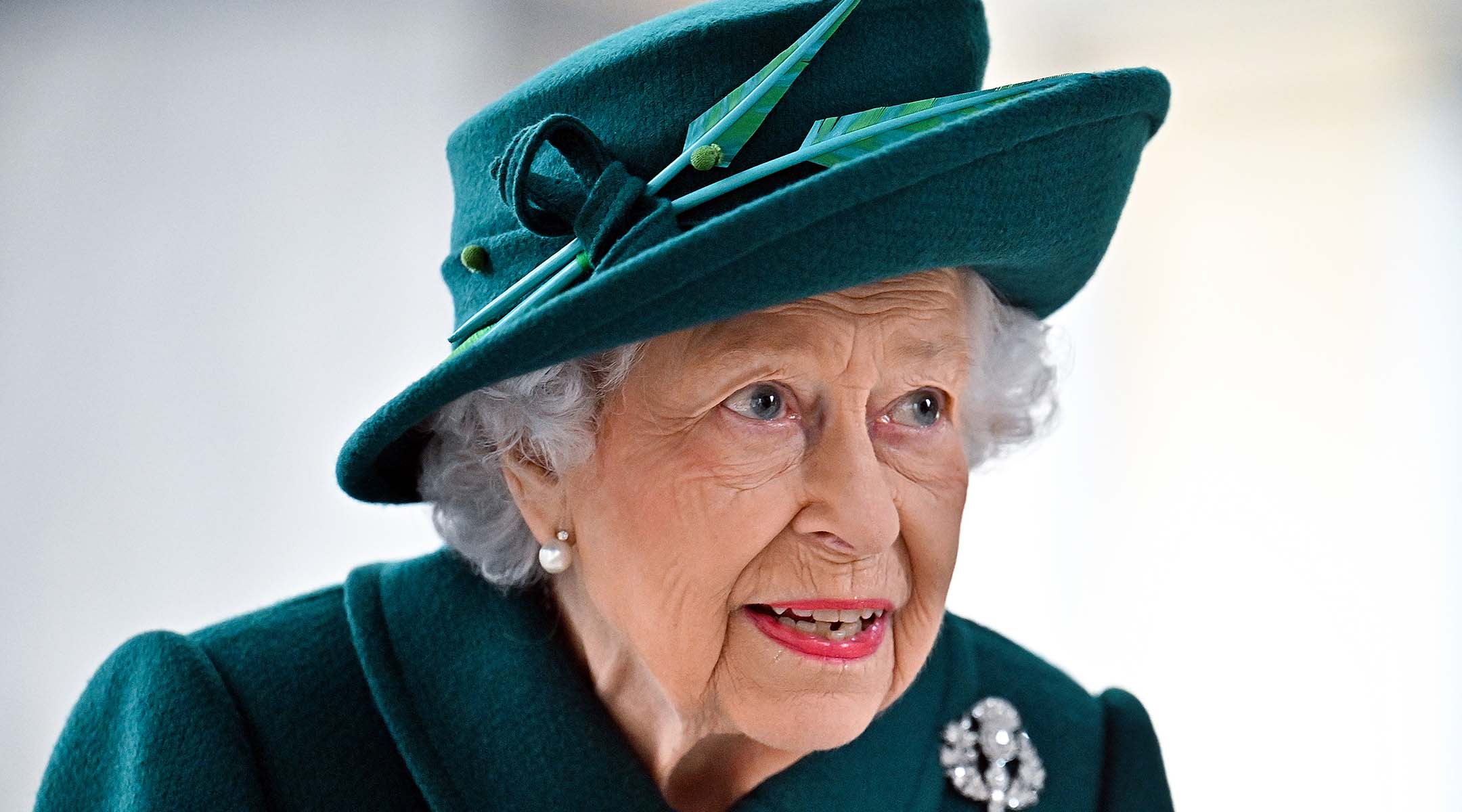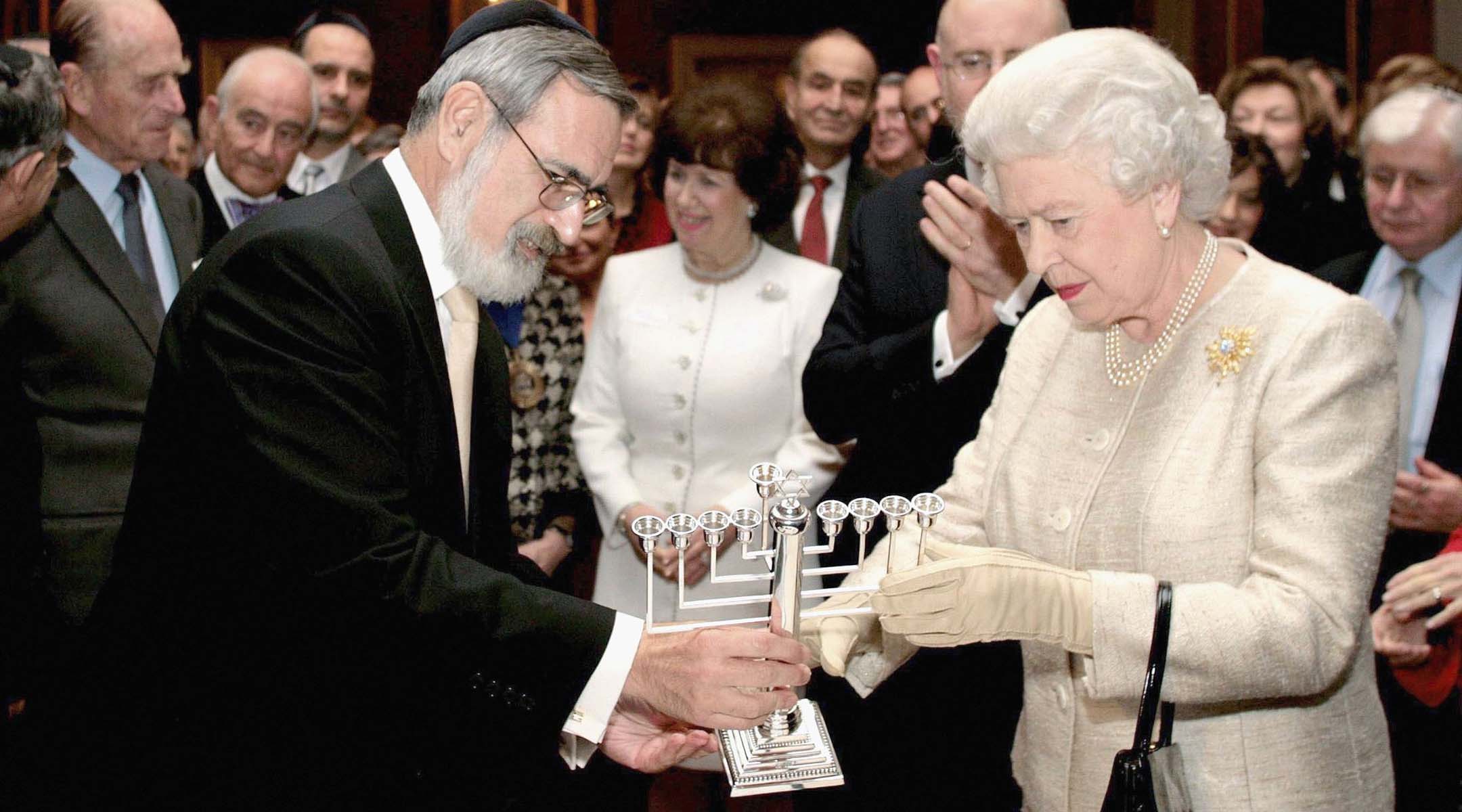Queen Elizabeth, whose reign encompassed the 20th-century ascent of British Jewry, dead at 96
British Jewish leaders echoed figures from around the globe in pronouncing the ‘end of an era.’

Queen Elizabeth II arrives for the opening of the sixth session of the Scottish Parliament in Edinburgh, Oct. 2, 2021. (Jeff J Mitchell/Getty Images)
(JTA) — The reign of Queen Elizabeth II, Britain’s longest-serving monarch who died Thursday at 96, encompassed the grief and the redemption of 20th century British Jewry, as well as their evolution in British society from exoticized outsiders to inside players and leading figures.
The passing of the queen, who was surrounded by her children and grandchildren, has launched a period of widespread mourning and uncertainty among Britons, who are already unsettled by a battered economy and political upheaval spurred by a departure from the European Union and a quick succession of three prime ministers.
Among other things, Elizabeth’s life spanned several of the century’s most consequential wars, the advent of the internet and the COVID-19 pandemic. She inherited the throne in 1952, after a rushed series of devolutions across the British empire, including the ouster of Britain from Mandatory Palestine in 1948, which led to the founding of the state of Israel.
In the postwar sheen of the defeat of fascism, monarchies seemed increasingly obsolete over time, but Elizabeth oversaw a transition to symbolism that preserved the crown’s pomp and standing throughout British society.
British Jewish leaders echoed the sentiments expressed by dignitaries and presidents across the globe on Thursday.
“No words can fully describe the extent of our nation’s loss,” the Board of Deputies of British Jews said in a statement. “Her Majesty’s wisdom, benevolence and dedication to duty served as an inspiration to generations of British citizens, including our community. May Her memory be for blessing.”
Ephraim Mirvis, the United Kingdom’s current chief rabbi, said Elizabeth cherished the Jewish communities in the countries over which she reigned.
“We recall with much appreciation the warm relationship she had with the Jewish community with a particular commitment to interfaith relations and Holocaust memorial,” he said in a video message he posted to social media. “I recall how on one occasion, she showed me and my wife items of Jewish interest and value in her private collection in Windsor Castle, including a Torah scroll rescued from Czechoslovakia during the Holocaust. Her affection for the Jewish people ran deep, and her respect for our values was palpable.”
Elizabeth Alexandra Mary Windsor was born in 1926 into a Britain in which Jews were thriving in London’s East End, not far from the palace where she would be raised once her father assumed the throne 10 years later. After having been exiled from Britain in 1290 after a series of massacres, Jews had been welcomed back into the country in the late 1600s but were not yet fully assimilated.
By the time of Elizabeth’s childhood, Jews featured prominently among the nation’s cultural and business elites — two years before her birth, Harold Abrahams became a hero to British boys when he won a gold medal in track at the 1924 Olympics.
But they were also made to be apart in a country where brownshirts sympathetic to Adolf Hitler freely marched until Britain entered into war, and where stereotypes of Jews as vulgar and grasping were so pervasive and casual that they routinely cropped up in Agatha Christie mysteries. British antisemitism persisted after the war, as chronicled in a fictionalized account broadcast recently on PBS.
Elizabeth’s youth reflected these tensions: Her uncle, Edward VIII, abdicated the throne to marry an American, and soon he and his wife, Wallis Simpson, became friendly with Hitler. Meanwhile, her husband Philip’s mother, Princess Alice, sheltered a Jewish family in Axis-occupied Athens.
The Windsors, perhaps heeding fanciful notions that Britons were descended from a lost tribe, had their sons circumcised — something that unusual at the time. The practice among royals predated by at least a century the belief that circumcision may be medically beneficial. Elizabeth, wanting a professional to do the job, brought in a mohel named Jacob Snowman.

The hiring of Snowman for such delicate work characterized the close relationship between the British princess and the Jewish community, one that continued when she assumed the throne. The Jewish community sent her birthday greetings not long after she ascended to the throne, and she eagerly thanked the chief rabbi at the time for the message in 1952. Elizabeth would eventually elevate several chief rabbis to knighthood, and two to the House of Lords. (The position of chief rabbi was one that dated back to the return of the Jews to England in the 1600s, and later spread to a number of countries and territories Britain colonized, including Ireland, British Mandatory Palestine and South Africa.)
Heeding the advice of the British foreign office, which sought to repair ties with Arab nations after the debacle of the 1956 Middle East War, when Britain, France and Israel sought to bring Egypt to heel, Elizabeth avoided the appearance of closeness to Israel for decades. Her husband Philip — honoring his late mother, who was deemed a righteous gentile — visited the country on an unofficial visit in 1994. Her grandson, Prince William, made the first kingdom’s first official visit in 2018.
The postwar era was a time of increasing Jewish assimilation into all sectors of British society, including its elites. The fact that Lord Snowdon — the husband of Elizabeth’s sister Princess Margaret — was Jewish barely registered. When Princess Diana, citing Charles’ unfaithfulness, sought to divorce him, she hired Anthony Julius, one of the country’s most prominent lawyers who was also a scholar of Jewish history.
By the time of Margaret Thatcher in the 1980s, Jewish Cabinet ministers abounded — five at one point — and by the 2000s, two Jews led the opposition: Michael Howard was the Conservative leader from 2003-2005 and Edward Miliband was the Labor leader from 2010-2015.
Israeli President Isaac Herzog called her death the “end of an era.”
“Throughout her long and momentous reign, the world changed dramatically, while the Queen remained an icon of stable, responsible leadership, and a beacon of morality, humanity and patriotism,” he said in a statement. “In her life and in her service to her people, the Queen embodied a spirit of integrity, duty and ancient tradition.”
This article originally appeared on JTA.org.
A message from our Publisher & CEO Rachel Fishman Feddersen

I hope you appreciated this article. Before you go, I’d like to ask you to please support the Forward’s award-winning, nonprofit journalism so that we can be prepared for whatever news 2025 brings.
At a time when other newsrooms are closing or cutting back, the Forward has removed its paywall and invested additional resources to report on the ground from Israel and around the U.S. on the impact of the war, rising antisemitism and polarized discourse.
Readers like you make it all possible. Support our work by becoming a Forward Member and connect with our journalism and your community.
— Rachel Fishman Feddersen, Publisher and CEO

























